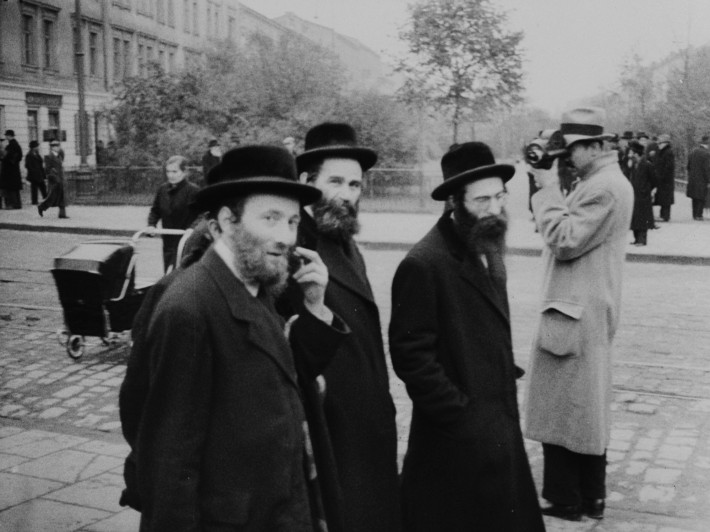Using, losing, resurrecting ‘A Different World’
Messages from Poland: Using, losing and resurrecting ‘A Different World’
In 1987 Channel 4 broadcast the nine-part documentary series, The Struggles for Poland. One of its parts, A Different World, is now available on DVD. Martin Smith, its producer, describes the long process in getting it to home video.
 About the author: Martin Smith has been making and writing documentary films for British and American television for more than thirty years. His awards include an EMMY, several BAFTA nominations, two George Peabody Awards, an ‘Outstanding Archival Achievement’ prize from the British Film Institute, a Royal Television Society Award, and numerous Film Festival successes. His work has been the subject of two special screenings (1998, 2000) at the Sheffield International Documentary Film Festival, a BBC educational film, and a Hungarian television documentary. A pioneer in narrative museum exhibitions, his work as Exhibition Director at the United States Holocaust Memorial Museum, Washington, D.C., resulted in an Award for Design Excellence from President William Clinton. In January and April 2010 his nine-hour series ‘The Struggles for Poland’ was the subject of two complete retrospective screenings at London’s Imperial War Museum. In May 2010, his film about one of Britain’s worst coal-mining disasters ‘The Terrible Price – Gresford 1934’ was one of the opening attractions at the British Film Institute’s Mediatheque in Wrexham.
About the author: Martin Smith has been making and writing documentary films for British and American television for more than thirty years. His awards include an EMMY, several BAFTA nominations, two George Peabody Awards, an ‘Outstanding Archival Achievement’ prize from the British Film Institute, a Royal Television Society Award, and numerous Film Festival successes. His work has been the subject of two special screenings (1998, 2000) at the Sheffield International Documentary Film Festival, a BBC educational film, and a Hungarian television documentary. A pioneer in narrative museum exhibitions, his work as Exhibition Director at the United States Holocaust Memorial Museum, Washington, D.C., resulted in an Award for Design Excellence from President William Clinton. In January and April 2010 his nine-hour series ‘The Struggles for Poland’ was the subject of two complete retrospective screenings at London’s Imperial War Museum. In May 2010, his film about one of Britain’s worst coal-mining disasters ‘The Terrible Price – Gresford 1934’ was one of the opening attractions at the British Film Institute’s Mediatheque in Wrexham.
His personal website can be found at: www.aboutmartinsmith.co.uk
As I began writing this (1 October 2013), the BBC’s news website had a headline: ‘Holocaust historian Israel Gutman dies in Jerusalem’. I am saddened. Professor Gutman, wounded fighting the Germans in the 1943 Warsaw Jewish Ghetto uprising, has often been in my thoughts these past two years. He’s in my computer alongside film images of Jewish life in Poland.
[Israel Gutman, film interview]: These were the days that the Germans went from house to house and they burned the buildings and blew them up. And the fire, the heat penetrated the bunkers that were underground and poisoned everything – ruined the water, ruined the food. [Cut to a still of the Warsaw ghetto uprising.] There wasn’t any air. The air was boiling and people were living in a true hell, a true hell.
Filmed in 1985 by Raye Farr, with whom I had worked on The World at War, the interview is part of a nine-part documentary series The Struggles for Poland. The international co-production was transmitted in 1987 by Britain’s Channel 4, America’s PBS station WNET and Germany’s Norddeutscher Rundfunk. In addition to decent ratings, its successes included a British Film Institute award for ‘Outstanding Archival Achievement’, a book by Neal Ascherson and a Polish film season at Britain’s National Film Theatre.
However, the series drew insults and anger from a section of Britain’s Polish community. The first three films chronicle the rebirth of the Polish nation from 1919 until the Second World War. These, and especially the third, A Different World, provoked a heated correspondence in Britain’s Polish language daily newspaper Dziennik Polski. As Neal Ascherson reported in Index for Censorship (January 1988): ‘The letters culminated in a call for the establishment of a British-based ‘Committee for the Defence of the Good Name of the Motherland’ which would vet applications by ‘foreign’ media or scholars to study Polish archives … A few complainers suggested that the entire series had been deliberately financed by Jewish money, in order to damage the reputation of Poland.’
Some letters came directly to me: one anonymously informed me that the Polish community knew that my name was really Cohen: another, with a name and address, bluntly asked: ‘Who signed the cheques?’ ‘I did,’ was my reply as I pointed out that the money came from the broadcasters.
After the series completed its British run, Slowo Ojezyste (a periodical of the Polish Education Society) carried a commentary by its editor, Jerzy Samborski, in which he declared: ‘Polish history has never been presented on the international stage in such detailed, comprehensive and, at the same time, modern and attractive form … It is difficult to imagine a better way of popularising the Polish issue than showing The Struggles for Poland.’ The response to Samborski’s article by the Association of Polish Combatants was to ban the distribution of all Slowo Ojezyste copies containing Samborksi’s review. More importantly for the series, the controversy led to the withdrawal of an offer by a Polish-born British entrepreneur to finance the release of the series on VHS.


 Learning on Screen
Learning on Screen